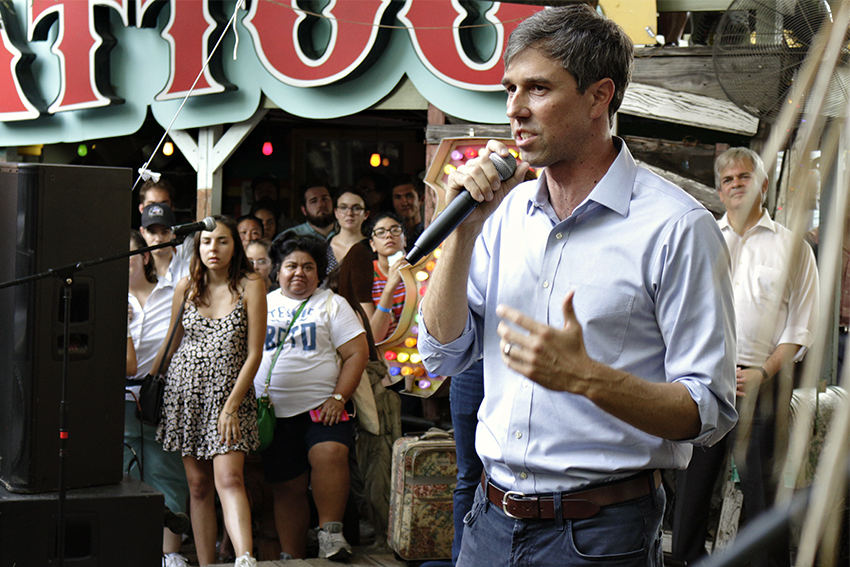One after another, Democrats are launching their bids for the Party’s 2020 nomination. But 2018 Senate candidate Beto O’Rourke is still mulling whether to run as he makes his way around the Midwest, home to several key battleground states in the election.
So, when one of our readers asked us, “What is Beto O’Rourke doing in 2020?” we looked into it as part of Curious Campus, a series where we answer reader-submitted questions.
O’Rourke told voters in the 2018 midterm campaign that he wouldn’t run for the presidency in 2020, but began receiving support for a run shortly after losing the U.S. Senate race in November to incumbent Ted Cruz, R-Texas. He was the closest Democrat — less than three points away — to winning a statewide seat in over 20 years.
Then, a few weeks ago, he met with Oprah Winfrey for an interview in Times Square where he said he was debating the effects of a run on his family, but that the answer would come by the end of February.
"That’s a big question for us to think through,” O’Rourke said. “I gotta tell you — I’m so excited at the prospect of being able to play that role. I want to make sure (with my family) that we’re all good with this.”
O’Rourke is still riding on the star power and national notoriety he built up during the 2018 midterms. Some say he could run against Republican Sen. John Cornyn, who is up for re-election in 2020, but government professor Daron Shaw said Beto’s best chance at the presidency is now, rather than six years down the road.
“The memory of the American public is pretty short,” Shaw said. “He's a hot thing right now. Not clear he's going to be a hot thing in 2024. And if the Democrat wins, you get a Democrat running for re-election. So if he has any aspirations nationally, now is the time to do it.”
Texas Politics Project director Jim Henson wrote an op-ed for The Texas Tribune shortly after O’Rourke’s midterm loss in November, that if he does have any Senate interest still, his best chance is 2020 — and he could win. Like the presidency, if he waits until 2024 for Cruz’s seat, he’ll lose a lot of his momentum. But Shaw said he doesn’t seem to be following that path based on his wanderings around the nation.
Though O’Rourke has yet to announce an official presidential bid, Shaw said he is all but sure the former El Paso Congressman will. However, O’Rourke notably doesn’t yet have a large campaign infrastructure, while most of the other candidates have been planning their runs for years.
Shaw said O’Rourke has relied on in-person campaigning and his personality to build up much of his stature, but has yet to develop his own signature policy priority that would stand out from the rest of the Democrats.
“If your claim is, ‘I’m a different kind of candidate, I see politics of the next 10 years in ways these others don’t,’ the natural question for voters to ask is, ‘What’s the issue?’” Shaw said. “And O’Rourke has not (answered that).”
At a dozen candidates so far, Shaw said the Democratic primary is likely to get more crowded before shrinking, possibly reaching up to 20 people. Public policy professor Victoria Soto said this will make fundraising difficult, even for candidates like O’Rourke who raised $80.1 million in his midterm bid.
“In Texas, it was just him, but that being said, I think he’s a very skilled fundraiser,” Soto said. “It’s going to be a crowded field, so it’ll be tough. But if anybody would be good at it, it would be him.”
If O’Rourke manages to grab the nomination, Shaw said it would put Texas on the electoral map for the first time in decades, a new twist for Republicans. Along with O’Rourke’s being from Texas, Shaw said Trump’s simplistic views on trade and immigration conflict with that of most Texans.
“Texas is (full of) social conservatives and entrepreneurial Republicans,” Shaw said. “And that's not who Trump necessarily speaks to particularly effectively … (O’Rourke) clearly would start off as a significant underdog. But even having the Republicans have to spend money in Texas would be a problem for them.”





















